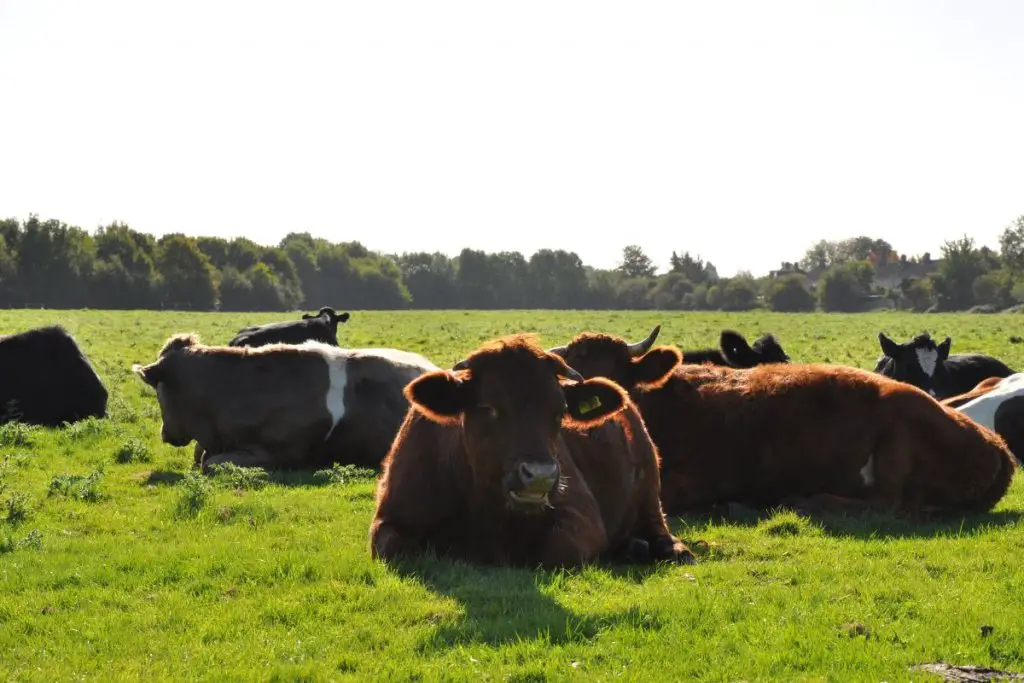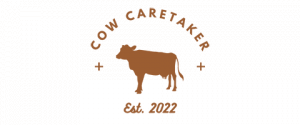When a cow lays down it could mean several things including fatigue, change in weather, chewing cud, injury, sickness, calving, or simply imitating herd behavior. This means laying down behavior could be a symptom of a healthy cow or a lack of animal welfare.
Cows naturally spend around half their day laying down.
Table of Contents
Why Cows Lay Down When It Rains
This study shows that dairy cows spend more time laying down on rainy days and other extreme conditions such as high wind. Cold weather is undesirable to cows so they might lie down when it’s raining due to cold stress, though this theory has commonly been associated with old wives’ tales.
Other theories include:
- Keeping grass dry: Cows can sense a change in air moisture so they will lay down to protect a dry patch of grass to graze on after the rain.
- Staying warm: Cows lay down when it rains to stay warm.
- Sensitive stomachs: Cows lay down because their stomach is sensitive to changes in atmospheric pressure which will happen when it rains.
- Heavy legs: Cow legs can absorb moisture so when it rains the legs will soften because of increased humidity. This will force a cow to lay down because the legs won’t support the weight of the cow.
- Heat stress: Although this is unlikely to be true since a study by the University of Arizona shows that cows spend more time standing during hot weather.
There is no scientific evidence to back these theories. It’s commonly agreed that cows will lay down when it rains to mimic herd behavior or rest because of fatigue.
As for thunderstorms, aside from visual and audio cues, cows don’t know when exactly a storm is coming. Although this belief is common folklore, there is no scientific evidence to prove it.
Other Reasons Why Cows Lay Down
Cows lay down for other reasons including:
- Resting or sleeping: Like human beings, cows need to rest. They are grazers and spend a lot of time on their feet so laying down allows them to relax and rest their muscles. Cows cannot sleep on their feet, so they will lie down when they want to sleep.
- Chewing cud: Cows lay down after they’ve eaten because they have to ruminate. Rumination helps them digest their food, so they will often lie down to chew cud.
- Calving: Cows lay down when they are ready to give birth. Delivery is easier when a cow is lying down.
- Following herd mate: Cows are social animals and will follow what their herd mates do. If one cow lies down, others may do the same, even if it’s not raining.
- Injury or sickness: It’s common for cows to lay down when they are injured or sick. If your cow is down for an extended period, contact your veterinarian.
Keep in mind that it’s perfectly normal for cows to lay down and rest for 4 to 7 hours per day and slightly more when night falls.

Do Some Breeds Lay Down More Than Others?
No, there are no breeds that lay down more than others. Even though some breeds are known to be more docile and others more aggressive, their behavior has nothing to do with their laying down habits.
Why Do Cows Lay Down And Not Get Up?
The most common reason why cows lay down and don’t get up is trauma. The condition is known as downer cow. Trauma can be due to diseases (mastitis), metobolic issues such as lack of calcium, or post-calving. If the cow is down for more than normal time, the muscles and nerves will be damaged.
Cows can recover from trauma with proper nursing and treatment. Signs of recovery include eating, drinking, and trying to stand. If a cow doesn’t show interest in eating or drinking and is continually down the possibility of recovery is slim.
